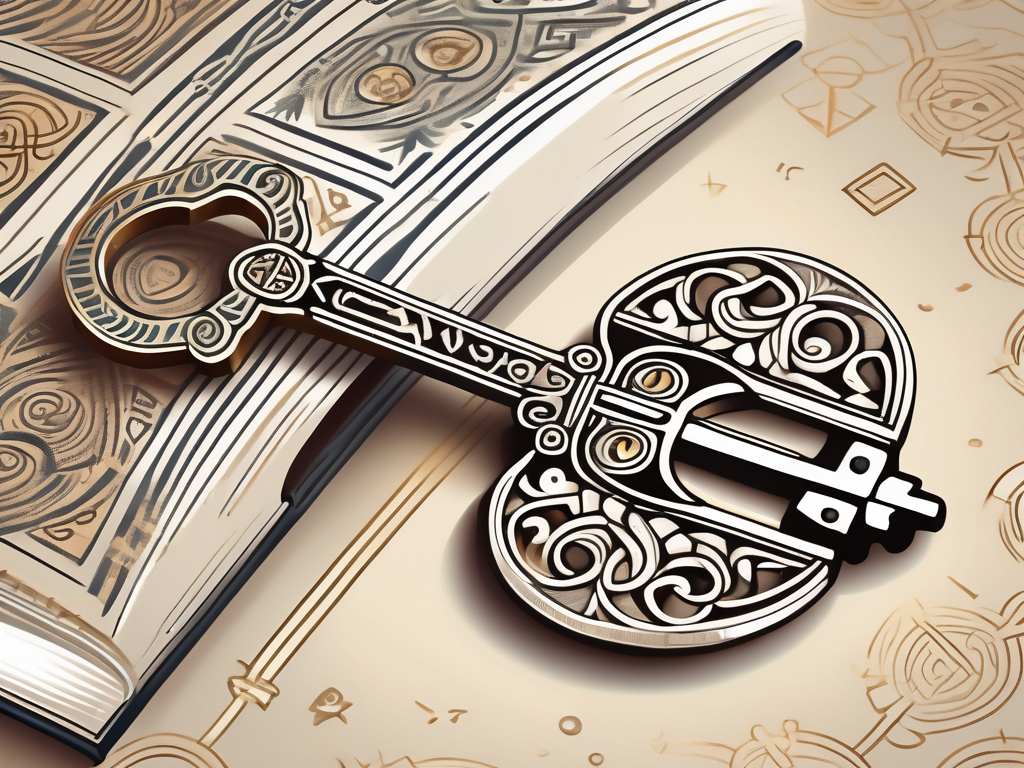Rehoboam was a significant figure in Judaism, whose reign as king of Israel left a lasting impact on the nation. To fully understand his role and significance, it is essential to delve into the historical context surrounding his rule, his ascension to the throne, his rule and policies, the revolt against him, and his ultimate legacy in Jewish history.
Understanding the Historical Context of Rehoboam
During Rehoboam’s reign, the kingdom of Israel was undergoing tremendous change and faced many challenges. It was a time of political uncertainty and turmoil, as the nation was grappling with the aftermath of King Solomon’s death and the division of the kingdom into two separate entities.
As Rehoboam ascended to the throne, he inherited a divided kingdom. The ten northern tribes, under the leadership of Jeroboam, rebelled against him and established the Kingdom of Israel, leaving Rehoboam with only the tribes of Judah and Benjamin, known as the Kingdom of Judah. This division had profound implications for both kingdoms and shaped the course of Israelite history.
Rehoboam’s reign was marked by constant tension and conflict between the two kingdoms. The Kingdom of Israel, under Jeroboam’s rule, sought to establish its own identity separate from Judah. They even went as far as creating their own religious practices and centers of worship, which deviated from the traditional practices of the Jerusalem temple.
Meanwhile, Rehoboam faced the challenge of maintaining control over the Kingdom of Judah. He sought to consolidate his power and assert his authority, but faced opposition from within his own kingdom. The people of Judah, still reeling from the division, were wary of Rehoboam’s leadership and questioned his ability to navigate the turbulent political landscape.
The Kingdom of Israel during Rehoboam’s Reign
Within the Kingdom of Israel, Jeroboam faced his own set of challenges. He had to establish a new capital, Shechem, and build a strong foundation for his rule. He implemented policies aimed at solidifying his power and preventing his subjects from having any allegiance to the Kingdom of Judah.
Jeroboam was also concerned about the religious unity of his kingdom. He feared that if his subjects continued to worship in Jerusalem, they might eventually reunite with the Kingdom of Judah. To prevent this, he introduced golden calf idols in Bethel and Dan, encouraging his people to worship there instead of in Jerusalem.
This religious division further deepened the rift between the two kingdoms. The Kingdom of Israel became known for its idolatry and deviation from the true worship of Yahweh, while the Kingdom of Judah held onto the traditions and practices of their ancestors.
Rehoboam’s Family Lineage
Rehoboam belonged to the dynasty of King David, making him the grandson of Solomon and the great-grandson of David. This lineage held immense importance in Jewish tradition, as it connected Rehoboam to the promise made by God to King David that his dynasty would rule over Israel forever.
However, Rehoboam’s family lineage did not guarantee a smooth reign. The division of the kingdom and the challenges he faced from within his own kingdom tested his leadership skills and ability to maintain the unity of the Davidic dynasty.
Despite the difficulties, Rehoboam’s reign left a lasting impact on the history of Israel. The division of the kingdom into Israel and Judah set the stage for centuries of conflict and rivalry between the two kingdoms. It also marked a turning point in the religious practices of the Israelites, as the Kingdom of Israel veered away from the worship of Yahweh and embraced idolatry.
In conclusion, Rehoboam’s reign was a time of political upheaval and religious division. The division of the kingdom and the challenges faced by both Rehoboam and Jeroboam shaped the course of Israelite history and had long-lasting implications for the future of the nation.
Rehoboam’s Ascension to the Throne
Following the death of his father, Solomon, Rehoboam faced numerous challenges during his coronation. His ability to navigate these obstacles would have a profound impact on the trajectory of his reign and the well-being of his kingdom.
The Death of Solomon and Rehoboam’s Rise
When King Solomon passed away, Rehoboam was anointed as his successor. However, his reign was immediately met with discontent among the people. The burdensome labor policies imposed by Solomon had caused widespread dissatisfaction, and many saw Rehoboam’s coronation as an opportunity for change.
As news of Solomon’s demise spread throughout the kingdom, whispers of hope and anticipation filled the air. The people yearned for a leader who would listen to their grievances and alleviate their suffering. Rehoboam, a young and untested ruler, found himself thrust into the spotlight, burdened with the weight of his father’s legacy and the expectations of his subjects.
Challenges Faced During His Coronation
Upon ascending the throne, Rehoboam faced a crucial decision regarding the complaints of his subjects. The older advisors of his father’s court advised him to ease the burdens on the people, recognizing the simmering discontent that threatened to boil over. They urged him to show compassion and understanding, to be a ruler who would prioritize the welfare of his kingdom.
On the other hand, the younger generation, fueled by ambition and a desire to assert their authority, advocated for a firm and unwavering stance. They believed that any sign of weakness would be seen as an invitation for rebellion, and that maintaining a position of unyielding power was the only way to secure their reign.
Caught between the wisdom of experience and the vigor of youth, Rehoboam found himself torn. The weight of his decision hung heavy upon him, as he grappled with the consequences that would follow. The fate of his reign and the unity of his kingdom rested upon the choice he would make.
As the day of his coronation approached, the tension in the air was palpable. The people anxiously awaited the announcement, their hopes and fears intertwined. Would Rehoboam choose to be a compassionate and just ruler, or would he succumb to the allure of power and authority?
Little did they know, Rehoboam himself was wrestling with his own doubts and uncertainties. The weight of his responsibility pressed upon him, as he contemplated the legacy he would leave behind. Would he be remembered as a wise and benevolent king, or would his reign be marred by strife and discontent?
The stage was set, and the fate of the kingdom hung in the balance. Rehoboam’s decision would shape the course of his reign and determine the well-being of his people. The eyes of the kingdom were upon him, waiting with bated breath for the moment when he would reveal his choice.
Rehoboam’s Rule and Policies
Rehoboam’s approach to governance had far-reaching consequences for the Kingdom of Judah and its relationship with the rest of Israel. His policies and decisions shaped the destiny of the nation and left a lasting mark on Jewish history.
Rehoboam’s Approach to Governance
Rehoboam demonstrated a firm and authoritarian style of rulership, aligning himself with the interests of the ruling elite rather than seeking to address the concerns of the common people. His refusal to abate the burdens placed upon the working class only served to deepen the rift between the kingdom and the ten northern tribes.
The Impact of Rehoboam’s Policies on the Kingdom
Rehoboam’s policies ignited a sense of discontent within the Kingdom of Judah itself, exacerbating the dissatisfaction that already existed among the people. The economic and social disparities caused by his rule further strained the already fragile relationship between Rehoboam’s kingdom and the rebellious Kingdom of Israel.
The Revolt Against Rehoboam
Rehoboam’s rule was marred by a significant rebellion that forever altered the political landscape of Israel. The revolt had deep-rooted causes and was driven by key figures who sought to challenge Rehoboam’s authority.
Causes and Key Figures in the Revolt
The revolt against Rehoboam was fueled by a combination of economic grievances, political discontent, and religious divisions. Jeroboam, one of Solomon’s former officials, emerged as the leading figure behind the rebellion, garnering substantial support from the northern tribes who were dissatisfied with Rehoboam’s rule.
Rehoboam’s Response to the Rebellion
In the face of the revolt, Rehoboam’s initial response was to muster his forces and quell the rebellion by force. However, he eventually heeded the advice of a prophet who urged him to refrain from engaging in a civil war. As a result, the revolt solidified the division between the Kingdom of Israel and the Kingdom of Judah.
Rehoboam’s Legacy in Judaism
Rehoboam’s rule left an indelible mark on Jewish history, shaping the interpretations of his reign in Jewish texts and influencing later Jewish leaders.
Interpretations of Rehoboam’s Reign in Jewish Texts
Jewish texts present varying perspectives on Rehoboam’s rule, offering a range of interpretations that reflect the diverse views within the Jewish community. Some texts paint Rehoboam as a tragic figure, while others view his reign as a cautionary tale highlighting the consequences of arrogance and the need for wise governance.
Rehoboam’s Influence on Later Jewish Leaders
Rehoboam’s actions and their outcomes served as lessons for future Jewish leaders. Subsequent generations drew inspiration from his rise and fall, seeking to avoid the mistakes that led to the division of the Israelite kingdom. As such, Rehoboam’s legacy influenced the policies and approaches of later Jewish leaders, who sought to ensure the unity and prosperity of their people.
In conclusion, Rehoboam’s significance in Judaism cannot be understated. His reign, marked by political divisions, challenges, and a significant revolt, continues to shape the understanding of Jewish history and offers valuable insights for future leaders. By examining Rehoboam’s historical context, rule, and legacy, we gain a deeper appreciation for the complex nature of his leadership and the enduring impact it had on the Jewish people.












